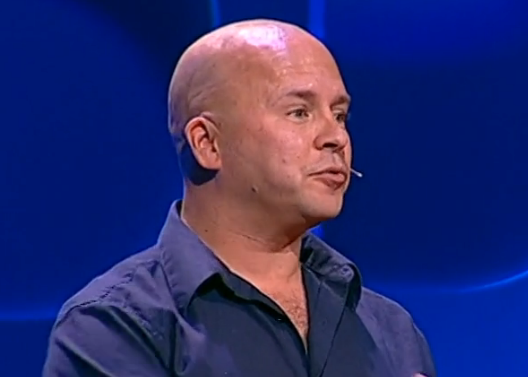It goes like this: 163 people across four separate tests.
比如这个:163个人进行4组不同测试。
Everyone wrote down their personal goal.
每个人写下他们各自的目标。
Then half of them announced their commitment to this goal to the room, and half didn't.
然后一半实验的人在房间里宣布他们的目标承诺,另一半人保守目标。
Then everyone was given 45 minutes of work that would directly lead them towards their goal,
接下来每个人有45分钟来工作,他们可以努力工作直至实现他们的目标,
but they were told that they could stop at any time.
但他们在任何时候也可以停下来工作。
Now, those who kept their mouths shut worked the entire 45 minutes on average,
那些不泄漏目标的人平均工作了整整45分钟,
and when asked afterward, said that they felt that they had a long way to go still to achieve their goal.
在这之后的访问,他们感到他们为了实现目标还有很长的一段路要走。
But those who had announced it quit after only 33 minutes, on average,
但是那些宣布目标的人们平均工作大约33分钟后就放弃了,
and when asked afterward, said that they felt much closer to achieving their goal.
当被问及时,他们感到快要接近目标了。

So if this is true, what can we do? Well, you could resist the temptation to announce your goal.
所以如果这是事实,我们会怎样做?好吧,大家可以抵制住宣布目标的诱惑。
You can delay the gratification that the social acknowledgment brings,
大家可以延迟这种社交承认带来的满足,
and you can understand that your mind mistakes the talking for the doing.
大家明白脑子会把说的当成做的来替代。
But if you do need to talk about something, you can state it in a way that gives you no satisfaction, such as,
但是如果你的确要谈论一些目标,你说到这些目标时不带有任何满足感,例如,
"I really want to run this marathon, so I need to train five times a week and kick my ass if I don't, okay?"
“我的确想要跑马拉松,所以我需要每周训练5次,如果我做不到,就踢我的屁股吧?”
So audience, next time you're tempted to tell someone your goal, what will you say? Exactly! Well done.
所以观众们,下一次当你试图告诉别人你的目标时,你会说什么?完全正确,做对了。



